total time: 3.25 minutes
total words: 654
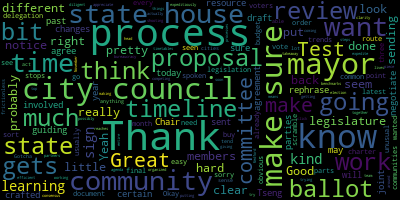
total time: 9.0 minutes
total words: 1156
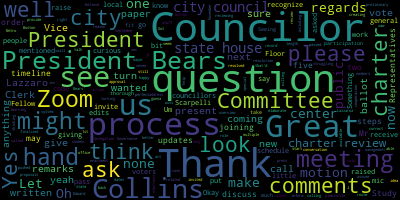
total time: 3.4 minutes
total words: 564
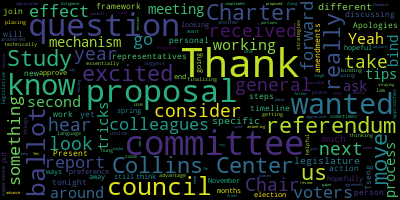
total time: 0.83 minutes
total words: 145
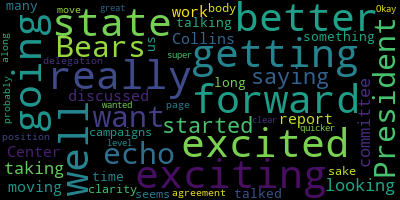
total time: 1.04 minutes
total words: 193
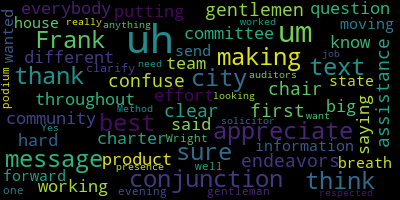
[Kit Collins]: Test 1-2, test 1-2.
[Justin Tseng]: I'm calling this committee meeting to order. We're meeting on paper 24-468, resolution to discuss updates to the city charter, be it resolved by the Metro City Council that the Governance Committee discuss updates to the city charter, including creating a timeline for action and reviewing proposals of the Charter Study Committee once finalized. Representatives of the Edward J Collins jr center for public management at Boston are invited to provide an overview of the charter review process and the next steps for the city council. Mr. Clerk may call the role.
[Adam Hurtubise]: President Bears.
[Zac Bears]: Present.
[Adam Hurtubise]: Vice President Collins Councilor Lazzaro.
[Justin Tseng]: present, seven present or five present, two joining us, or one joining us, and the meeting is called to order. Great. Before we start, do any councillors have comments or questions about this paper, about Charter Review? I see President Bears on Zoom, and I recognize President Bears.
[Zac Bears]: Thank you, Chair Tseng. Just wanted to thank the Collins Center representatives for being there in person. Apologies that I can't join you there tonight. I'm really excited to hear from the Collins Center what the next steps are for the council to take action on the proposals and the framework of the Charter Study Committee. I know that we haven't received that yet, so we won't be discussing their proposals and specifics, but more of what the timeline will look like in the new year for us to consider that. And, you know, I have a few questions after we hear from them, but in general, I'm excited to work with my colleagues on this committee to consider, you know, any amendments to the proposals from the study committee. And then my personal preference, I think, would be to hopefully report something out by the end of the spring to put on the ballot in November that would go. And then if the voters were to approve it, it would go into effect after the 2027 or for the 2027 election. So still a ways away from this going into effect, but really excited and hopeful and looking forward to working with my colleagues over the next few months on finalizing a proposal and getting that before the voters. Thank you.
[Justin Tseng]: Thank you, President Bears. Fellow Councilors, have any preliminary questions, comments, remarks? Councilor Lazzaro.
[Emily Lazzaro]: I just want to echo what President Bears was saying, and I'm really excited about getting started and looking forward to taking what the committee discussed and what the Collins Center has to report and moving forward and getting going. This is really exciting work. This is something that we've been talking about for a long time and what many of us talked about during our campaigns as well. So this is very exciting. So I'm excited to get going.
[Justin Tseng]: Thank you, Councilor Collins, Councilor Lazzaro. The mic system is new, so we're all still learning the ins and outs of turning stuff on and off. Do any other Councilors have any comments before we invite the Collins Center up? Doesn't seem like it. I just wanted to thank you all for being here at this meeting, for being willing to have this conversation with us and giving us a better idea of where the city council fits in into the charter review process. I'd like to invite our representatives from the Collins Center up to make any remarks. Yes. Yes, yeah, that'd be perfect. There's a small button I believe you have to press on the right with the multiple people. There we go. And I'll ask your name and address for the record, please.
[Contreras]: Marilyn Contreras, the Collins Center at UMass Boston.
[Wright]: Thank you. Frank Wright, Collins Center at UMass Boston. Thank you so much.
[Justin Tseng]: The Floor is yours.
[Contreras]: Okay. In terms of the, I don't need this. In terms of the council's role, you will receive a proposal from the mayor and you will review it and then there'll be perhaps some negotiation. There has to be agreement of the council to accept this charter by a majority vote and for the mayor to approve it. And then it goes to the state legislature. And that's the process that you really have to watch quite carefully. It will be filed by your legislative delegation on the city's behalf. And it will be the bill we assigned to the municipal and regional government committee. And they will hold a hearing. And they will also reach out to other committees that might have something to contribute to the analysis of the charter. For example, the section dealing with elections might go to the elections committee, that kind of thing. And the committee reports the bill out. And after that, it continues its journey through the statehouse. The committee on third reading reviews the bill to determine its consistency with the legislative drafting manual and the requirements of the manual. The House and Senate council will look at it in terms of internal consistency and consistency with state law. And then it will be put on the House and Senate calendars for vote. If they accepted, if it's voted yes in both houses, it goes to the governor's office. They conduct a final review and they sign it. Now, if you want this on ballot in November of 2025, you really need to work with your delegation to make sure that you get it back by September 1st, so that the summary can be prepared, the ballot can be prepared, and you're not, you know, in fingernail-biting time.
[Justin Tseng]: I have a question about that. The state house process, is there a general length as to how long that review process might look to help us inform us about our timeline?
[Contreras]: It depends. It's a good year. It's an odd year. So they're in session the whole time. They'll be holding their, they'll be meeting regularly. There won't be long recesses. But the state budget process comes along in May. And that takes up basically May, June, and sometimes July. So it's best if you can get as much as you can on the front end before they start the budget deliberations, and maybe get it out at the end of the summer.
[Justin Tseng]: Great. Thank you. And one more question. The plebiscite process, could you elaborate a little bit what that looks like if we wanted to put it on the ballot for November, or just the ballot in general? And is it common to go that route?
[Contreras]: Yes, yes. The legislature has an expectation if you make major changes that it will go to the voters.
[Justin Tseng]: Great. I had two questions that related to what you had just said, but if you have more comments, I'm happy to.
[Contreras]: No, no. I want you to know what you want to know. So we're prepared for the questions.
[Justin Tseng]: Thank you. Let me turn the floor over to my fellow Councilors and see if they have any questions for now. And if there are any struggling questions, I'll ask. Please raise your hand if you're on Zoom so I can see. President Bears.
[Zac Bears]: Thank you. Yeah, you answered one of my questions around the referendum. My second question is, what is the mechanism that we use for the referendum? Is it technically that the council is placing a non-binding ballot question on the ballot, or is there another mechanism of mass general law that we're using in this case to place a referendum on the ballot?
[Contreras]: Usually the act itself contains the provisions that you're going to use. to put a question on the, the question that goes on the ballot will be inside the charter document itself, will be inside your special act, the directions on how.
[Zac Bears]: And is that a bind? And so then essentially the language of that bind.
[Contreras]: Yes.
[Zac Bears]: Thank you.
[Justin Tseng]: So do any of other Councilors have questions? I think see Vice President Collins, give me one sec.
[Kit Collins]: Great. Thank you, Chair Tseng. Thank you so much for being here today. And I know you've been very involved in guiding the committee's work over the past year or so. So thank you so much for being a resource to our community. So just to rephrase, I haven't been on the committee, so I'm, you know, just want to make sure I'm learning learning this process. So there's the draft that's been crafted. We're going to get a proposal from the mayor. The city council will review that. We may negotiate and make certain changes that the mayor can also sign off on. Once we have that joint agreement between the city council and the mayor on a proposal that both parties agree to, then it is sent to the state legislation. sorry to our state delegation. And at that point, this document that then has kind of the buy in of the City Council, the mayor sign off and review by the legislature, then that would go to the voters for the final vote before.
[Contreras]: Yes.
[Kit Collins]: Okay, great. Just wanted to make sure I had all those parts of the process in the right order. Thank you. Yeah.
[Justin Tseng]: Thank you, Collins. Um, do any other Councilors have questions? I see Councilor Scarpelli's hand raised on zoom.
[George Scarpelli]: Uh, thank you, uh, uh, gentlemen chair. I appreciate first your assistance and these endeavors. I think that, uh, to be clear, I think that not to confuse everybody, but this is, this is what the conjunction with the, um, the charter committee that's been working so hard throughout the community. I don't, I know that I had a question with, uh, just a text that the message text message saying, is this different? And I said, no, it's, uh, This is all conjunction, so this is a big team effort and making sure that we're putting the best product out and making sure that we have the best information moving forward. So we send this off to the state house that we're all in 1 breath. So, um, I just wanted to clarify that. Um, and then, uh, if I can having the gentleman at the podium this evening. Frank Wright, one of the most well-respected city auditors that I've ever worked with. I really appreciate his presence. And then Frank, if you need a job, Method's looking for a city solicitor and we could do anything you want. Thank you.
[Justin Tseng]: Thank you. Thank you, Councilor Scarpelli. Do we have any other Councilors with questions, remarks? I think none for now. Oh, Vice President Collins.
[Kit Collins]: Thank you. So I know that this probably looks different, like the timelines probably look a little bit different in every community. I know you've spoken a little bit to timelines already, like what's the latest that we would want to get the charter back from the legislature? What are those like hard stops that we need to get it on the ballot if we're going that route? When you've seen this process get done in other communities, are there any sort of like, very obvious common trends that you see like usually once it gets back to the city council it's a three month process it's easy to get it in before budget time or it's not unusual for it to be a bit of a scramble is there anything that you tend to notice from when this done other cities.
[Contreras]: Yes, I've worked in several communities and it can be, it really depends on where the council is and where the mayor is and what you, you know, maybe three, three and a half months. But I think one of the drivers is this, to get it into the legislature so you can get it out. And so if they're going to get it in June, you're calling it too close.
[Wright]: I think that's to Marilyn's point earlier. That's why you want to make sure you're working closely with your state delegation. So you don't want to just bring it on them when you don't. You want to make sure they're in the loop and they know this is coming. Maybe they can give you some heads up on what your timetable should be.
[Kit Collins]: Gotcha. Thank you. That makes a lot of sense. I want to make sure that it gets to them and have it be kind of frictionless by the time it gets to the state house so that they'll be able to act on it expeditiously. Thank you.
[Contreras]: The municipal and regional government committee will expect local officials to testify.
[Kit Collins]: Good to know. Thank you.
[Justin Tseng]: Thank you. I see President Bears' hand raised on Zoom.
[Zac Bears]: Yeah, I just want to take advantage of your experience. on any tips and tricks around the legislative process. I know sometimes things can get hung up. Are there any other strategies and approaches that you can suggest? I was thinking, would it be helpful to invite our delegation to a council meeting where they can see us report it out or come to a committee meeting and ask questions in advance? Just any tips and tricks to move this through the legislature would be much appreciated.
[Contreras]: Basically, it's different now because the committee assignments, sometimes you're looking for advocates who've maybe done charter work before on the municipal and regional government committee. That's one outreach that I've seen. Do you have any?
[Wright]: No, I mean, it can't hurt to include your state delegation, although I don't know what type of role that you will find that they'll take prior to actually getting the document. The other thing is, the more you may stray from what the legislature is used to seeing, the more likely it is it's going to get hung up in the legislature, because people are going to want to examine what you're proposing, which they perhaps have not seen or have not regularly seen across the Commonwealth, and that can result in delay. and we wanna make sure the process keeps going.
[Zac Bears]: If I could follow up, Chair Singh.
[Justin Tseng]: Yeah, yeah, I was just gonna ask.
[Zac Bears]: Thank you. Along those lines, would it be possible for us as a committee, as we move through different pieces of the proposed charter and different portions of that, to consult with you on how far those proposals may be straying from a standard or something the legislature is more familiar with?
[Contreras]: Yes. We will be available to the council for any questions that they have.
[Zac Bears]: Great. Thank you so much.
[Justin Tseng]: Thank you. On that question, I've talked to a few members of our state delegation with regards to what the cooperation might look like. Something they mentioned is once they receive it, they might be able to talk with us about what they think might pass the state house, what they think might not pass the state house and make edits. Would those edits have to come back to the city council and mayor's office for approval?
[Contreras]: Probably not. There is, the legislative drafting manual requires that you give direction to the legislature. And the usual direction to the legislature is that you can, that any changes that you make should have to be approved by the mayor.
[Justin Tseng]: Great, thank you. Are there any other questions from councilors? I had one more written down. With regards to the enactment process, could you give us a little bit, a look into what that process looks like once, let's say the voters do vote yes on the new city charter?
[Contreras]: There'll be a set of directions in the charter in terms of what happens when, in terms of As one of the councilors has already noted, if it's on the ballot in 2025, then the terms and the composition of the council, if that changes, the first election would be November of 2027. The budget process will start in fiscal year 20, it will start July 1st, 2028. so that everybody has the script.
[Justin Tseng]: Got it. And with regards to the vote itself, let's say by some reason the State House doesn't get it passed by September 1st, would the vote be pushed to the next ballot it's available for? Is that something that we'd have to work to schedule with
[Contreras]: You would need another special act if you wanted to put it on a state election ballot, just like you did with the two and a half questions.
[Justin Tseng]: Okay, great. And so I assume the dates for the elections are just written into the special act itself? Yes. Is that correct? Great. Those are the questions I have written down for now. Do other Councilors have questions? Don't see any hands on Zoom. Great. Oh, Vice President Collins. I saw you thinking.
[Kit Collins]: Thank you. Yeah, it does seem to me that the, as with most things having to do with our partners in the State House, it seems like the steps there are pretty clear, pretty organized. They're just, you know, that's where the bureaucracy lives, so we have to make sure that we're- You're competing with their entire agenda.
[Contreras]: Yeah, we just have, yeah, exactly. So that's why your delegation has to, be on top of where things are and where things appear to be going awry. Exactly. Yeah, it seems like that's that's pretty clear.
[Kit Collins]: We just have to be as soon as we can. Right. We just have to be really clear about working with their timetables, getting on top of it and giving them as much time and notice as we possibly can. And I think for our process, that means trying to expedite the process of coming to consensus about what we are sending to them. And I appreciate also the clarity around which of those processes to click into if we're shooting for a November 2025 ballot, or if we're going to, again, try to put it on a state election ballot. So I think that these are all really good benchmarks to have as we head into 2025. And I think my takeaway is making sure that we're being diligent and efficient with our piece of the process, putting together the proposal that we'll actually be sending to the state house so that we can make sure that all the hard work that community members, mayor's team, city council, community members have put into this process reaches the state house in time for them to review it and do what we want on the timeline that works for Medford.
[Justin Tseng]: Thank you. I see Councilor Lazzaroa's hand up. Let me get that mic up here.
[Emily Lazzaro]: For the sake of clarity, also, it seems to me that the more we can be, the more our body and our state delegation can be on the same page and in agreement with each other, the better The better position we would be probably to move it along quicker at the state level as well. Okay, great. I just wanted to be super clear.
[Justin Tseng]: Well, and piggybacking on that question, I was curious, you had mentioned that usually local officials are expected to testify. Is there anything else that we should know about as city councillors with regards to letters we may send?
[Contreras]: Oh yes, they also accept written testimony.
[Justin Tseng]: Is there anything else that we should be aware of schedule or make sure that we do before outside of the actual process of voting out of the city council.
[Contreras]: That's the most important thing really.
[Justin Tseng]: Okay, great. Um, I tend to ask this question in almost every meeting I've been to make sure I'm not missing anything. I'm curious what other frequently asked questions you might receive from city councilors from legislate from people in local government about the charter review process, things that we haven't asked that we should ask or that we should know.
[Wright]: You've been very diligent and thorough.
[Contreras]: I really think that What you need to know is that the charter is the legal foundation for the community. And it's also describing your structure in basic ways. You're trying to create a document so that when a resident picks it up, they can get a pretty good sense of how the city of Medford works. And it's a document for the future. So my pet peeve is when a charter commission wants to solve the problem that happened in 1957 and bring that forward now, even though it could never happen again. So I just urge you to keep, is this serving Medford in 10 years? Is this serving Medford in 12 years? That's the focus as opposed to what happened in 1968. Great, thank you.
[Justin Tseng]: Before I turn it over to public part, oh. I recognize President Bears.
[Zac Bears]: Thank you. I just wanted to say that's the second compliment this council has received from the Collins Center in as many years on our diligence. So we appreciate that. But I just wanted to also ask, is there any know, maybe I'll leave this for a more specific session, but I just wanted to thank you guys again for being here, for answering our questions, moving through the process, and I really look forward to working with you as we review the proposal of the Charter Study Committee and get to an agreement with the mayor. Thanks.
[Justin Tseng]: Thank you, President Bears. Are there any other comments before I turn it over to public participation? Seeing none, I'll call for public participation now. Thank you so much. If you're on Zoom, please raise your hand. If you're in person, please come up to the podium. Seeing none. Great. Well, I just wanted to thank you all again for coming to our meeting for giving us such a thorough, thorough explanation of the process of where we fit into it of the steps that we should, we should take and we should expect to take in the next few months as well. I'm sure we'll be relying on you all for feedback and for advice as well. But thank you for coming here, introducing yourselves to the new Councilors who haven't seen you around before. I'm very grateful. I'm very excited to get this off the ground from our end, to get this to the State House and to the voters as well. I think Medford's been itching for this change. the hard work that everyone, the Charter Study Committee, the call-in center, Councilors have and will put in to this process in the coming future. Thank you so much. Do we have any motions? Oh, I see President Bears.
[Zac Bears]: Just wanted to move to keep the paper in committee and adjourn.
[Justin Tseng]: Great. On motion, I'll give the clerk a second to type. On the motion to keep the paper and committee and adjourn by President there's seconded by Councilor Lazzaro. Mr. Clerk, can you please hold the roll?
[Adam Hurtubise]: President Bears?
[Zac Bears]: Yes.
[Adam Hurtubise]: Vice President Collins, Councilor Lazzaro, Councilor Scarpelli.
[George Scarpelli]: Yes.
[Adam Hurtubise]: Councilor Tseng.
[Justin Tseng]: Yes. Five and affirmative, none against. Motion passes.